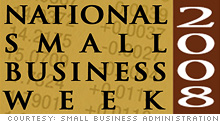It's National Small Business Week. Should you care?
The SBA-backed National Small Business Week returns for its 55th annual outing in Washington, providing valuable networking opportunities for some, but little tangible action on key policy issues.

(FORTUNE Small Business) -- Monday marks the start of National Small Business Week (NSBW), a five-day event intended to spotlight the accomplishments of America's entrepreneurs and draw policymakers' attention to the challenges confronting them. But after more than 50 years, the annual Small Business Administration-run event still remains off the radar of many small business owners.
"That's certainly news to me," said Jason Lazar, who was unaware of a week dedicated to honoring businesses such as his $8-million-a-year firm. Lazar is the co-founder of KeyOn Communications, a wireless broadband provider in Omaha that serves small and rural markets.
Maplewood Software CEO Nancy Janzen was loosely familiar with the phrase "National Small Business Week" - but thought it referred to a publication, rather than an event. An active participant in the activities of her local chamber of commerce in Spokane, Wash., Janzen said she pays little attention to National Small Business Week because she's too busy running her seven-person firm to pursue such things as small-business awards, the granting of which is one of the week's main activities.
Started in 1963 to spotlight small-business contributions to America's economy, National Small Business Week features a mix of awards ceremonies, networking events, discussion forums and educational talks by politicians and business executives. Held in Washington, D.C., and New York City, the events will be webcast for the first time this year, so that entrepreneurs around the country can tune in.
"What they'll get is the chance to hear from key leaders on some of the critical issues impacting small business, such as doing business with the government and going global," said Susan Walthall, chairwoman of National Small Business Week and the SBA's acting deputy associate administrator for entrepreneurial development. "We're going to cover those two areas, as well as health care and the energy challenge."
Most speakers on the roster this week are government officials, such as President Bush, United States Trade Representative Susan Schwab, and Michael Leavitt, secretary of the Department of Health and Human Services. Small-business voices will surface primarily in panel discussions and during awards ceremonies.
Some business owners who make the effort to attend National Small Business Week events say they provide valuable information and networking opportunities.
Serial entrepreneur Peter Justen first learned of the week three years ago as he started his most recent venture, MyBizHomepage.com, a software company that offers dashboards to help business owners navigate Intuit Inc.'s (INTU) QuickBooks and manage their financials. Justen attended for the first time last year, and came away impressed. At one lunch, he met Brian Moran of the Moran Media Group, a publishing house that produces magazines for trade groups and many of the SBA's partner organizations. Justen worked out a deal to advertise in Small Business Success, a biannual magazine sent out to SBA, SCORE, and small-business development center offices.
"Our paths probably would have never crossed otherwise," Justen said. "Typically, I would have had to do a blind call to the editorial staff and worked my way up from there." Moran also joined the advisory board for MyBizHomepage.com a few weeks ago.
Other networking opportunities also paid off: Several of last year's SBA award winners began using MyBizHomepage.com after meeting Justen at events during the week. This year, Justen is paying to help sponsor the event, a move he hopes will raise his company's profile.
Small Business Week permeates Washington, D.C., at the highest levels: President Bush, who will meet with some award winners Wednesday at the White House, opened the week with a formal proclamation calling on Americans "to observe this week with appropriate ceremonies, activities, and programs that celebrate the achievements of small business owners and their employees and encourage the development of new small businesses."
But little action is tied to the lofty rhetoric. The week's organizers at the SBA acknowledge that they are focused more on raising general awareness of small businesses' hefty contributions to the American economy than they are on pushing forward direct policy advances to help business owners.
That needs to change, especially as the ailing economy takes its toll on entrepreneurs.
"Washington hasn't been stepping up to the plate nearly enough," Senator John Kerry, chairman of the Senate Committee on Small Business and Entrepreneurship, wrote in an e-mail to FSB. "National Small Business Week is a time to insist on actions not just words to help the small businesses which created more than nine out of 10 new jobs over the past 15 years. These small business owners are out there everyday in today's tough economic climate where it's harder and harder to afford the energy bills, pay for health care for their employees, and expand their payrolls."
Those struggles leave many entrepreneurs with little spare time for Small Business Week's pomp and circumstance. And, of course, the very idea of celebrating a business for being "small" rankles some founders with grander dreams. KeyOn Communications' Lazar envisions the day his company will outgrow its "small-business" classification and swim with bigger fish.
"There's nothing wrong with being a small business, but we're trying to explain what a huge opportunity our company is offering, rather than being recognized for our smallness," he said. ![]()
Slump-busting strategies
Visa fight leaves businesses short summer workers
Energy bill promises lower-cost biz loans
-
The Cheesecake Factory created smaller portions to survive the downturn. Play
-
A breeder of award-winning marijuana seeds is following the money and heading to the U.S. More
-
Most small businesses die within five years, but Amish businesses have a survival rate north of 90%. More
-
The 10 most popular franchise brands over the past decade -- and their failure rates. More
-
These firms are the last left in America making iconic products now in their twilight. More








